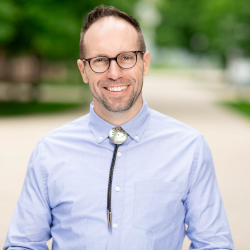In this episode of Perspectives, we speak with Adam Johnson, Consortium NEH Fellow.
 Adam introduces us to his book project, which examines the shifting relationships between white ethnographic fieldworkers and Pueblo and Navajo communities in the American Southwest around the documentation of sensitive information. By contrasting Anglo universalist conceptions of knowledge with Pueblo and Navajo epistemic systems, which both have restrictions on the free flow of information (though in quite different ways), he shows that Indigenous practices of information control constrained ethnographic fieldwork methods. In response, Southwesternists regularly dropped the emerging gold-standard of participant observation to pursue Indigenous knowledge that was purposefully withheld from them, adopting tactics that isolated and coerced individual informants. The consequences of ethnographic extraction were complicated: for many communities, not only was sacred knowledge profaned when outsiders learned of it, but the publication of such information risked that even unsanctioned members of their own communities might learn things about which they were supposed to be ignorant.
Adam introduces us to his book project, which examines the shifting relationships between white ethnographic fieldworkers and Pueblo and Navajo communities in the American Southwest around the documentation of sensitive information. By contrasting Anglo universalist conceptions of knowledge with Pueblo and Navajo epistemic systems, which both have restrictions on the free flow of information (though in quite different ways), he shows that Indigenous practices of information control constrained ethnographic fieldwork methods. In response, Southwesternists regularly dropped the emerging gold-standard of participant observation to pursue Indigenous knowledge that was purposefully withheld from them, adopting tactics that isolated and coerced individual informants. The consequences of ethnographic extraction were complicated: for many communities, not only was sacred knowledge profaned when outsiders learned of it, but the publication of such information risked that even unsanctioned members of their own communities might learn things about which they were supposed to be ignorant.
Closed-captioning available on YouTube.
To cite this podcast, please use footnote: Adam Johnson interview, Perspectives, Consortium for History of Science, Technology and Medicine, May 25, 2023, /video/161